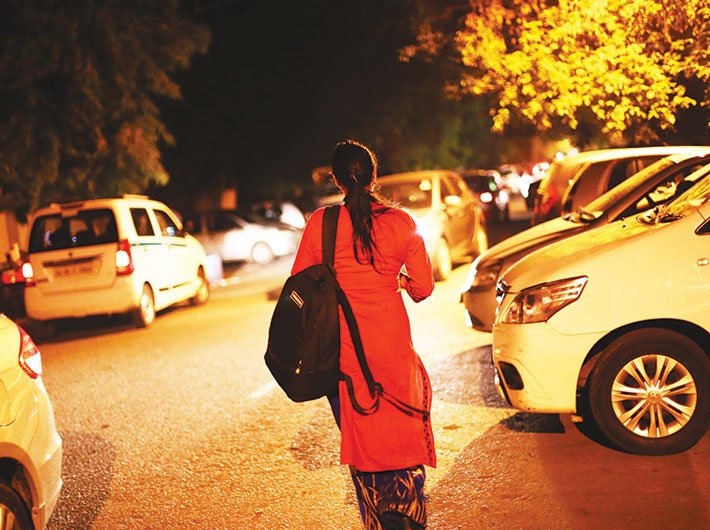The government wants to allow women to work in night shifts across all sectors. But will the economy benefit? And what about women?
The brutal murder of a 23-year-old Infosys employee inside her work area in office in Pune, in January, allegedly by a security guard, has plunged the IT industry in a state of shock, angst and outrage. The victim – Rasila Raju OP had come to office alone to work on a project on a Sunday evening, which is a common practice among IT professionals. Rasila, who had reportedly reproached the guard for staring at her before, was strangled to death inside her plush office, while all the security arrangements, including the CCTV cameras remained futile.
The incident has brought up the issue of security of women from the industry working in the ‘graveyard shift’. On the other hand, Factories (Amendment) Bill, 2016 which intends to allow women to work in night shifts in all sectors, awaits its passage in Rajya Sabha. A crucial question against this backdrop is: are we ready for a regime where women can work in the night?
At present, the Factories Act, 1948 allows women to work only between 6 am and 8 pm. The IT and ITeS (IT-enabled services) industry, among others, are exempted under the Act, provided they ensure certain prerequisites such as safe transport for women employees. In the wake of the descending participation of women from workforce – down to 27 percent in 2014 from 35 percent in 1990 – the government introduced the amendment bill in Lok Sabha last year to enable women from all the sectors to opt for night shifts. States like Maharashtra,
Karnataka and Tamil Nadu have already amended their respective Shops and Establishment Act and the Factories Act, 1848 paving way for the women to work overnight. Although the bill is seen as an important step towards achieving gender parity [see box] at workplace, absence of foolproof mechanism to ensure safety for women – especially during the ungodly hours – is indeed a cloud on the horizon.
In spite of strict preventive laws, cases of sexual harassment of women at workplaces continue to surface, the most recent being the allegation involving founder-CEO of popular YouTube channel TVF, Arunabh Kumar. So, at a time when the women are reporting more cases of harassment at workplaces, how many will be willing to venture out during the night?
What women want?
Tanya Bhardwaj, a 24-year-old IT professional from Lucknow works in a reputed software company in Pune. Her current project requires her to work in a night shift for a week every month along with one of her teammates. “Neither I, nor my parents were really comfortable with the idea of me working through nights. The teammate working with me could be a boy or a girl,” says Bhardwaj.
As per the government’s guidelines, it is mandatory for a company to seek the women employee’s consent before allotting her a night shift. But does this actually happen?
In 2016, when Bhardwaj joined the company, her appointment letter did not mention anything about working in night shifts. But when she was assigned her current project, she was not given any choice and was expected to work in the night. “CCTV cameras and security measures including deployment of the guards gave me an impression that I am safe inside the office. But after Rasila’s murder, I don’t feel the same way. We have seen that those who are supposed to protect you, can turn into perpetrators,” she says.
Narrating an incident when her colleague faced hostility from her manager and the HR department for not wanting to opt for the night shifts, Bhardwaj says, “Night shifts are really tough. They turn your routine upside down. My colleague couldn’t manage working through nights at a stretch, so she got herself transferred to a different project. But her transition was not at all easy.”
Thankfully, after Rasila’s death, Bhardwaj’s company has allowed its employees to work from home during night shifts. This has brought relief to all the employees including Bhardwaj.
However, she can’t imagine herself working in a night shift for long, even with the option of working from home. Her answer is a definite ‘no’ when asked if she would continue working in a night shift after marriage and kids.
Another sector which sees majority of women working in the night is nursing or the patient care. Manorama (name changed) is a trained nurse from Delhi. She used to work in a private hospital and followed both day and night routines. “The overall nature of the job requires a lot of dedication and support from the woman’s family. Some men are not comfortable with the idea that their wife goes to take care of strangers in a hospital, especially at night. Then more issues come up and the end result of such cases is women quitting their jobs.” Manorama too had to quit her job after she got pregnant. She was expected to give her full time to her family.
However, Evelyn Kannan, secretary general, Trained Nurses Association of India (TNAI), feels that the nursing discipline is highly regulated and most hospitals have implemented strict rules to ensure best possible routine and lifestyle for nurses. “Nurses are supposed to be allotted night shifts only seven times in a month. They get better compensation for working in night shifts, and cannot be assigned a connected shift right after their night duty. There is a rest period, which has to be ensured,” she says. Kannan says that with exception of a few small private clinics, the rules are mostly followed and not many complaints regarding nurses’ night shifts have come her way.
“That is also because, right from their training in the colleges, they are well aware of the fact that they’ll have to take up night duty. They’re trained accordingly. They are not suddenly forced into it,” says Kannan.
She also believes that similar strict rules and regulations should be put in place for the women working in night shifts in other industries, especially manufacturing. “In case of hospitals, presence of a number of patients and their relatives also sometimes acts as a deterrent to inappropriate behaviour by the wardboys or male attendants. This kind of indirect external supervision is absent from the manufacturing units. Women there are more vulnerable to harassment,” says Kannan.
A reason to cheer
The labour force participation of women in India has fallen to 27 percent in 2014 from 35 percent in 1990, according to the data by the International Labour Organisation. ILO attributes the drastic fall partially to the lack of employment opportunities, and advises that “a policy framework encouraging and enabling women’s participation should be constructed with active awareness of the ‘gender-specific’ constraints that face most women”. Against this backdrop, the government’s decision may seem like a much needed push to increase female participation. It is expected to benefit women working in SEZs, textiles, garments, handicrafts and leather industries.
Yet, despite such strict regulations there are many nurses like Manorama who are not able to cope with the struggles of working during the night, and end up quitting their jobs.
Social realities
“The amendment [bill] suggests that night shift for women shall be allowed only if the employer ensures safety, adequate safeguards in the factory as regards occupational safety and health, equal opportunity for women workers, adequate protection of their dignity, honour and transportation from the factory premises to the nearest point of their residence,” notes a research study titled ‘Women and Night Shifts: Growth and Opportunities’, prepared by the National Commission for Women (NCW) and the industry body ASSOCHAM.
“But who ensures that these safeguards are in place?” questions Dithhi Bhattacharya, executive head of the Centre for Workers’ Management, a Delhi-based NGO. “The question is, does putting a law in place achieve violence-free workplaces? So, you have to take into account the social reality that we’re living in. Social reality remains that public spaces are not safe for women – definitely not at night,” she says.
According to Bhattacharya, women’s safety is subject to compliance of the law by the employers. “It’s no longer the monitoring framework of the government. The government has given up its role in monitoring workplaces. So, no random checks, no inspections that can be done by the labour department,” she says.
Bhattacharya, who has worked with women factory workers for years, feels that apart from work, women have to take care of the household responsibilities too. “At the end of the day, whether we like it or not, women do bear the double burden of raising a family. There is no arrangement of creches at the workplaces. There are no affordable nursing homes to take care of the elderly. In addition to that, women’s wages are not on par with men’s wages. Women are forced to withdraw from the workforce because of all these reasons – resulting in the decreased female participation,” she explains.
Agreeing with her, Pramodini Dash, secretary, Bharatiya Mazdoor Sangh – the trade union aligned with the RSS, staunchly opposes the proposed amendment. “We live in a society where a man expects his wife to bring him a glass of water on reaching home, without even realising that she too might be just back from work. What equality are we talking about? As long as men do not share the responsibility of raising children and doing household chores, women cannot step out in the night for work. Because night shift doesn’t mean rest during the day for women. It means working in home during the day and working in factories or offices during the night,” she says.
Although the amendment mandates transportation from the factory premises to the nearest point of her residence, Pratibha R, a former garment factory worker and now the vice president of the Garment and Textile Workers Union in Bengaluru, points out that it’s practically impossible to drop women off to their residences. She says, “All these women workers from garment factories belong to the lower middle class, and live in slums. It is not possible to physically accompany them to their houses.”
There are several other security concerns. Pratibha notes that almost all the supervisors in the garment factories are men, and majority of workers under them are women. “In my experience, management of the factories are also not interested in making these arrangements to allow women to work in the night shifts,” says Pratibha.
Confirming this view, Mallikarjun, deputy general manager (HR) of Bengaluru-based Gokaldas Exports, says, “Men working in select departments of the factory are assigned night duties, but we have no plan to involve women in the night shifts.”
Also, following all the safety norms set by the government requires a lot of investment from the employers’ side. Sujata Mody, president, Women Workers’ Union in Chennai, feels that no manufacturing industry is prepared to make the investment, and build the infrastructure to bring in the full-fledged round-the-clock functioning. “As per my knowledge, factories haven’t allotted night shifts to women yet. And as far as the question of engaging more women in the workforce remains, government needs to focus more on measures like sufficient leaves and improved working conditions for women,” she says.
Moreover, dependence of women on the employer for transport is “almost like bondage”. Mody says, “The public transport is not easily available in rural areas, which will make women rely completely on the employer for the transport during their night shifts. In this scenario, women have no bargaining capacity. The employer can withdraw the facility anytime, leaving women with no choice but to quit work. Freedom given to them will be conditional.”
pranita@governancenow.com
(The article appears in the May 1-15, 2017 issue)

